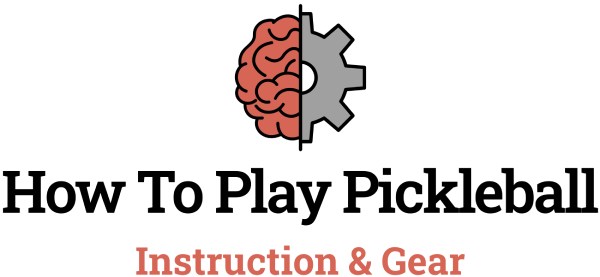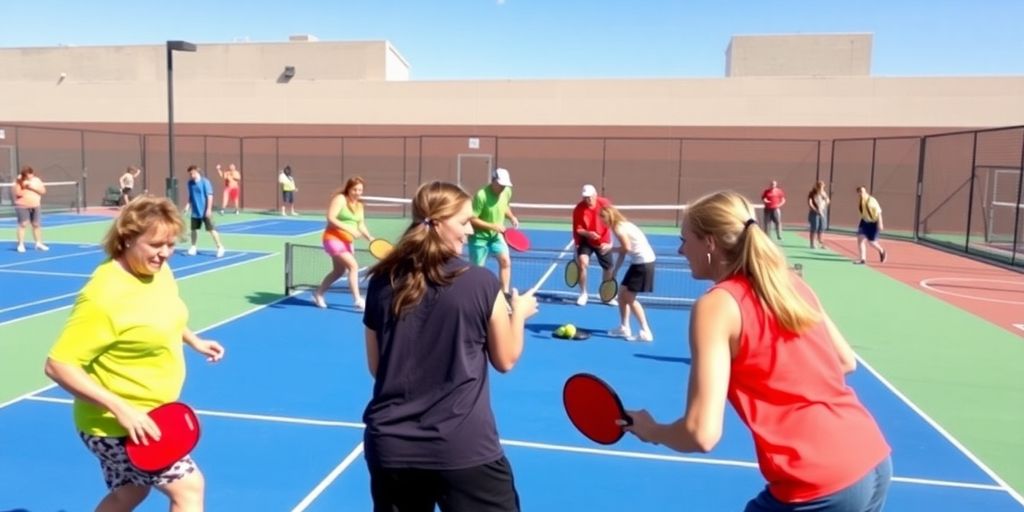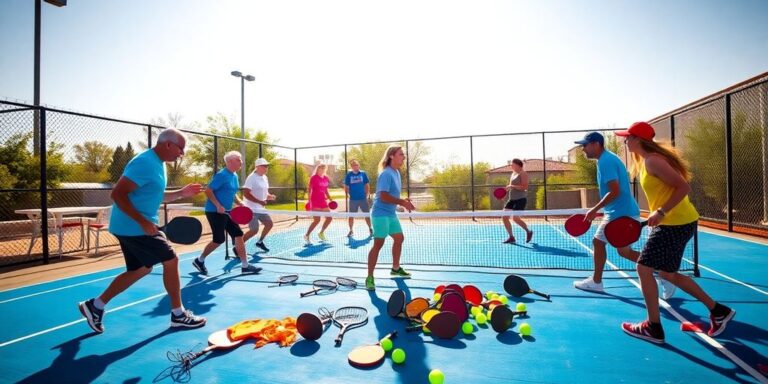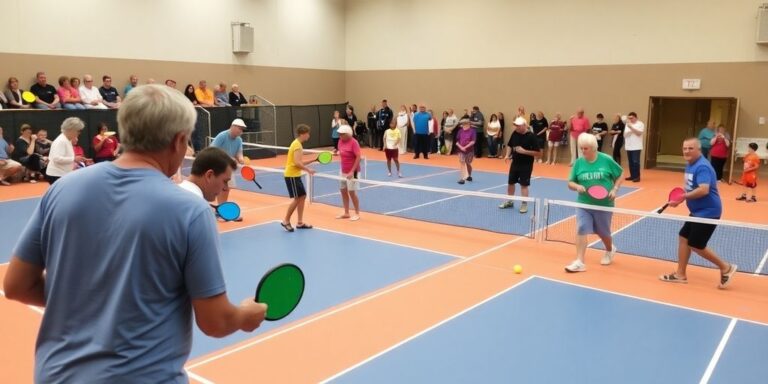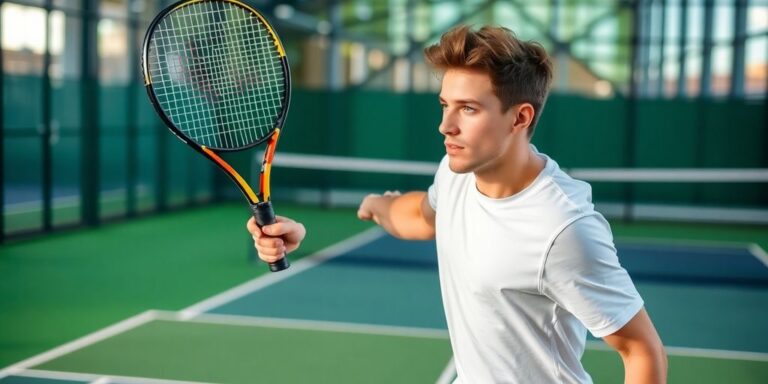If you’re looking to improve your pickleball skills, finding the right clinic can make all the difference. Whether you’re just starting out or looking to sharpen your competitive edge, there are plenty of options available. In this article, we’ll explore how to locate the best pickleball clinics near you, catering to all skill levels. From beginners to advanced players, there’s something for everyone, and we’ll help you navigate your choices.
Key Takeaways
- Pickleball clinics focus on specific skills, while camps offer a broader experience.
- Look for clinics that match your skill level to get the most benefit.
- Online resources and local clubs are great for finding clinics near you.
- Patient instructors can make a big difference for beginners.
- Evaluating reviews and costs helps ensure you choose a quality clinic.
Understanding Pickleball Clinics and Camps
Differences Between Clinics and Camps
Okay, so what’s the deal with pickleball clinics and camps? Are they the same thing? Not exactly, but the terms are often used interchangeably, which can be confusing. Think of it this way: a clinic is usually a shorter, more focused session, maybe a few hours, where you work on specific skills like dinking or serving. Camps, on the other hand, are generally longer, sometimes spanning multiple days, and cover a broader range of skills and strategies.
Benefits of Attending Clinics
Why bother with a pickleball clinic? Well, there are actually a bunch of good reasons.
- First off, you get focused instruction from experienced coaches. They can spot flaws in your technique that you might not even realize you have.
- Second, it’s a great way to meet other players and expand your pickleball network.
- Third, clinics often provide structured drills and exercises that help you improve specific aspects of your game. skill development is a big plus.
Attending a clinic can really give you that extra edge, whether you’re trying to nail your serves or master the art of the soft game. It’s all about targeted improvement and getting personalized feedback.
Choosing the Right Format for You
So, how do you pick the right pickleball clinic or camp? It really depends on what you’re looking to get out of it. Are you a total newbie just trying to learn the basics? Or are you an experienced player looking to fine-tune your game for tournaments? Consider these points:
- Skill Level: Make sure the clinic or camp is geared towards your current ability.
- Focus: What aspects of your game do you want to improve? Look for clinics that specialize in those areas. tournament performance is a common goal.
- Time Commitment: How much time are you willing to dedicate? Clinics are shorter, while camps require a bigger time investment.
Finding Local Pickleball Clinics
Okay, so you’re ready to find some pickleball clinics near you? Awesome! It’s easier than you might think. I remember when I first started looking, it felt a little overwhelming, but trust me, there are tons of resources out there. Let’s break down the best ways to track down those local clinics.
Using Online Resources
The internet is your best friend here. There are a bunch of websites and apps specifically designed to help you find pickleball courts, groups, and, yes, clinics. I usually start with a quick search on Google or DuckDuckGo for "pickleball clinics near me." You’d be surprised how many options pop up. Many of these sites let you filter by skill level, location, and price, which is super helpful. Don’t forget to check out dedicated pickleball websites; they often have comprehensive listings of local pickleball spots and events.
Community Centers and Local Clubs
Don’t underestimate the power of good old-fashioned community resources! Community centers and local clubs are goldmines for finding pickleball clinics. I found my first clinic through my local YMCA. They often have beginner-friendly programs at reasonable prices. Check out your city’s Parks and Recreation department website too. They usually have a calendar of events and activities, including sports clinics. Plus, these places are great for meeting people who live nearby and are also into pickleball. It’s a win-win!
Social Media Groups for Recommendations
Social media isn’t just for cat videos and political debates; it can actually be useful! Join some local pickleball groups on Facebook or other platforms. People are always asking for recommendations for clinics and instructors. It’s a great way to get honest opinions and find hidden gems that might not be heavily advertised. Plus, you can ask specific questions about the clinic’s format, instructors, and overall experience. I’ve gotten some amazing recommendations from these groups, and it’s also a great way to connect with other players in your area. You can even find information about pickleball clubs in your area.
Finding the right clinic can take a little bit of digging, but it’s worth the effort. Don’t be afraid to try out a few different options until you find one that fits your skill level, schedule, and budget. And most importantly, have fun!
Pickleball Clinics for Beginners
Introduction to Basic Skills
So, you’re thinking about trying pickleball? Awesome! Beginner clinics are the perfect place to start. These clinics focus on the real basics: how to hold the pickleball training equipment correctly, how to serve without messing it up completely, and understanding the basic rules. You’ll learn about the kitchen (the non-volley zone), the double-bounce rule, and how to score. The goal is to get you comfortable enough to actually play a game without feeling totally lost. Expect lots of repetition and simple drills. It’s all about building a solid base.
Finding Patient Instructors
When you’re just starting out, having a patient instructor can make all the difference. Look for clinics that specifically mention experience with beginners. Read reviews, if available, and see what other newbies have said about the instructors. A good instructor will break things down clearly, offer encouragement, and won’t make you feel bad for missing a shot (because you will miss plenty!). Don’t be afraid to ask questions – that’s what they’re there for! A good sign is if they emphasize fun and how to play pickleball over intense competition.
Building Confidence on the Court
One of the biggest hurdles for beginners is simply feeling comfortable on the court. Beginner clinics are designed to help you overcome that. You’ll be surrounded by other people who are also new to the game, which can be really reassuring. The focus is on participation and learning, not winning or losing.
Here are a few things that can help boost your confidence:
- Practice the basic strokes regularly, even if it’s just against a wall.
- Focus on your own progress, not comparing yourself to others.
- Celebrate small victories, like making a good serve or hitting a volley.
Remember, everyone starts somewhere. Don’t be afraid to make mistakes – that’s how you learn. The most important thing is to have fun and enjoy the process of learning a new sport. Don’t worry about pickleball tournaments just yet!
Intermediate and Advanced Pickleball Clinics

Enhancing Competitive Skills
So, you’ve got the basics down, huh? Now it’s time to really push yourself. Intermediate and advanced clinics are all about taking your game to the next level. This means focusing on strategy, consistency, and those tricky shots that separate the good players from the great ones. You’ll be working on things like third shot drops, dinking strategies, and how to effectively attack the net. It’s not just about hitting the ball harder; it’s about playing smarter.
Specialized Training Techniques
These clinics often introduce specialized training techniques that you won’t find in beginner sessions. Think about things like footwork drills designed to improve your court coverage, or specific exercises to tailored pickleball lessons and reaction time. You might even work with video analysis to break down your technique and identify areas for improvement. It’s all about fine-tuning your skills and developing a more well-rounded game. Some clinics might focus on:
- Perfecting your serve and return game.
- Mastering the art of the soft game and strategic dinking.
- Developing offensive strategies for doubles play.
Advanced clinics are not just about drills; they’re about understanding the nuances of the game and developing a strategic mindset. It’s about learning how to anticipate your opponent’s moves, exploit their weaknesses, and control the pace of the game.
Networking with Other Players
One of the biggest benefits of attending intermediate and advanced clinics is the opportunity to connect with other serious players. These are people who are just as passionate about pickleball as you are, and they can become valuable practice partners, teammates, or even just friends. You can share tips, strategies, and insights aimed at enhancing players’ skills, and learn from each other’s experiences. Plus, you never know when you might find someone to team up with for a tournament! It’s a great way to become more involved in the pickleball community and take your game to new heights. The dynamic nature and community spirit of pickleball is really something special.
Specialized Pickleball Clinics

Sometimes you need something more specific than a general clinic. Maybe you’re a senior looking for a gentler approach, or perhaps you want to focus on mastering the drop shot. That’s where specialized clinics come in. They cater to particular demographics or skill areas, offering targeted instruction.
Clinics for Seniors
Pickleball is super popular with seniors, and for good reason! It’s a great way to stay active and social. Clinics designed for seniors often focus on injury prevention, modified movement techniques, and strategies that emphasize smart play over aggressive power. These clinics understand the unique needs of older players, providing a supportive and encouraging environment. They might also incorporate longer rest periods and drills that are easier on the joints.
Youth Clinics and Camps
Get ’em started young! Youth clinics and camps are a fantastic way to introduce kids to pickleball. These programs emphasize fun, basic skill development, and teamwork. The instructors are usually experienced in working with children, using games and drills to keep them engaged. It’s not just about learning the game; it’s about building confidence and sportsmanship. Youth clinics are often structured around age groups to ensure appropriate skill levels and peer interaction.
Clinics Focused on Specific Skills
Want to perfect your dink? Or maybe your serve needs some serious work? Skill-specific clinics are the answer. These clinics zero in on particular aspects of the game, like:
- Dinking and drop shots
- Serving and returning
- Volleying and blocking
- Court positioning and strategy
These sessions provide intensive instruction and drills to help you master that one skill you’ve been struggling with. They’re great for players who want to enhance competitive skills and take their game to the next level. You’ll get personalized feedback and targeted practice to see real improvement. Finding a pickleball partner to practice with after the clinic can help reinforce what you’ve learned.
I remember attending a dinking clinic last year. I thought I knew how to dink, but the instructor showed me some subtle techniques that made a huge difference. My short game improved dramatically, and I started winning more points. It’s amazing how much you can learn when you focus on one specific skill.
Evaluating the Best Pickleball Clinics
Instructor Qualifications
When you’re trying to find a good pickleball clinic, the instructor is super important. You want someone who knows their stuff, but also someone who can actually teach. Look for instructors with certifications from organizations like the PPR or IPTPA. It’s also good to check their playing experience – have they competed at a high level? Do they have a good track record of helping players improve? Don’t be afraid to ask about their background and teaching philosophy. A good instructor can make all the difference.
Participant Reviews and Testimonials
Before you sign up for a clinic, see what other people are saying. Check online reviews on sites like Yelp or Google Reviews. Look for patterns – are people consistently praising the instructor’s teaching style? Are there complaints about the organization or facilities? Pay attention to both positive and negative feedback to get a balanced view. You can also ask the clinic organizers for testimonials from past participants. A few good reviews can give you confidence that you’re making the right choice. Also, consider checking social media groups dedicated to pickleball locations in Charlotte for local opinions.
Cost vs. Value Analysis
Pickleball clinics can range in price, so it’s important to think about what you’re getting for your money. A cheaper clinic might seem appealing, but it could mean less experienced instructors or fewer hours of instruction. On the other hand, a super expensive clinic isn’t always better. Consider these factors:
- Instructor experience: More experienced instructors often charge more.
- Clinic length: Longer clinics usually cost more, but offer more in-depth training.
- Coach-to-player ratio: Smaller groups mean more personalized attention, which can be worth the extra cost.
- Facilities: Access to good courts and equipment can improve your experience.
Ultimately, the best value is a clinic that meets your needs and helps you improve your game without breaking the bank. Think about what you want to get out of the clinic and compare the costs and benefits of different options. For example, Big City Pickle offers various options, so comparing their offerings might be useful.
What to Expect at a Pickleball Clinic
So, you’re thinking about signing up for a pickleball clinic? Great choice! It’s a fantastic way to improve your game. But what exactly happens at one of these things? Let’s break it down so you know what you’re getting into.
Typical Schedule and Structure
Most pickleball clinics follow a pretty standard format. You’ll usually start with a warm-up, maybe some light cardio and stretching to get your body ready. Then, the instructor will go over the day’s focus. This could be anything from dinking to serving to volleying. After that, it’s practice time! Expect drills, drills, and more drills. You’ll work on specific skills, get feedback from the instructor, and try to implement what you’re learning. There’s often some match play at the end to put your new skills to the test. Lunch is often included between morning and afternoon training sessions.
Equipment and Gear Needed
Okay, what do you need to bring? First and foremost, your paddle! Make sure it’s in good condition. Wear comfortable athletic clothing that allows you to move freely. Court shoes are a must – you don’t want to be slipping and sliding around. Bring a water bottle to stay hydrated, and maybe a small towel to wipe off sweat. Some people like to wear a hat or visor to shield their eyes from the sun. And don’t forget sunscreen! Here’s a quick checklist:
- Paddle
- Court shoes
- Athletic clothing
- Water bottle
- Towel
- Hat/visor (optional)
- Sunscreen
Post-Clinic Practice Tips
The clinic is over, but your pickleball journey isn’t! The real improvement happens when you take what you learned and put it into practice. Here are a few tips:
- Focus on one or two key things: Don’t try to overhaul your entire game at once. Pick one or two things you learned at the clinic and concentrate on those. For example, you can focus on fundamental skills.
- Drill, drill, drill: Set aside time to practice the drills you learned at the clinic. Repetition is key to building muscle memory.
- Play with different people: Playing with a variety of partners and opponents will expose you to different styles and strategies. This will help you adapt and improve your overall game. You can also check out local pickleball groups.
Remember, improvement takes time and effort. Don’t get discouraged if you don’t see results immediately. Keep practicing, keep learning, and most importantly, keep having fun! Consider attending more clinics to continue refining your skills and expanding your knowledge of the game. You can also improve by spending more time on the pickleball court.
When you join a pickleball clinic, you can look forward to learning the basics of the game, improving your skills, and having fun with others. You’ll get to practice with experienced coaches who will help you understand the rules and techniques. Plus, it’s a great chance to meet new friends who love the sport just like you! Ready to dive into the exciting world of pickleball? Visit our website to find a clinic near you!
Wrapping It Up
So there you have it! Finding the right pickleball clinic or camp can really boost your game, no matter if you’re just starting out or looking to sharpen your skills. With so many options out there, it’s all about picking one that fits your level and what you want to get out of it. Whether you want to meet new friends, learn from the pros, or just have a good time, there’s something for everyone. So grab your paddle, hit the court, and enjoy the game!
Frequently Asked Questions
What is the difference between a pickleball clinic and a camp?
A pickleball clinic is usually a shorter training session that focuses on specific skills, while a camp is a longer event that covers a wider range of skills over several days.
What are the benefits of attending a pickleball clinic?
Attending a clinic can help you improve your skills, learn from experienced instructors, and meet other players who share your passion.
How can I find pickleball clinics near me?
You can search online, check community centers, local clubs, or ask for recommendations in social media groups.
Are there clinics for beginners?
Yes, many clinics cater to beginners and focus on teaching basic skills and building confidence on the court.
What should I look for in a pickleball clinic?
Look for qualified instructors, read participant reviews, and consider the cost compared to the value you will receive.
What can I expect during a pickleball clinic?
You can expect a structured schedule with skill-building activities, guidance on equipment needed, and tips for practicing after the clinic.
